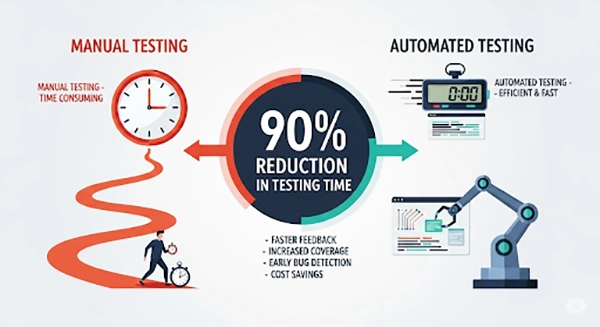E-commerce business is one of the fastest growing businesses in the online world. It is not different from any other business when it comes to customer experience. Customers expect a smooth and hassle-free shopping experience while purchasing goods online. They demand seamless browsing, instant page loads, secure transactions and a well laid out user journey which create a flawless user experience. If there’s even a slightest glitch in the customer journey, it creates a direct impact on the business.
E-commerce products usually have a complex user flow, features and its websites have intricate designs with respect to product placement, its detailing while leading all the way up to the final checkout and payment process. Naturally, with all these complexities in the online portal, it becomes imperative for the business to go through a thorough testing process to cover each and every aspect of it.
Unlike manual testing, automated testing becomes a necessary part of ensuring quality and delivering a high-end product to the customer. In this article, we are going to examine the role of automated testing in boosting an e-commerce business and how one can leverage it to drive their business growth.
KEY TAKEAWAYS
- Automated testing is crucial for e-commerce due to complex user flows, frequent updates, and the high cost of manual testing.
- It reduces time spent on repetitive tests and allows non-technical team members to write test cases, significantly cutting project costs.
- Automated tests are more comprehensive and less prone to human error, ensuring a flawless customer experience.
- Speeding up the testing phase allows businesses to launch new products and updates faster without sacrificing quality.
- Automated tools can perform various tests, including functional, regression, and performance testing, to ensure all aspects of an e-commerce site are covered.
Understanding the Role of Automated Testing in E-commerce Product
In an e-commerce business, the stakes are high because of the frequent updates in the website, complex user journeys and cross-device compatibility. Testing all these areas requires heavy reliance on expertise of the testers. They must understand all the possible scenarios in the shopping experience to be able to test them. Acquiring a working knowledge of the portal and to test them thoroughly demands a lot of dedicated time, effort and thereby, cost.
Moreover, the frequent updates in the product design require most of the test cases to run repeatedly. Companies cannot afford to run all the test cases manually because it would cost them more expenses and time. Hence, automated testing comes as a rescue for such scenarios. Let’s examine its role in e-commerce.
Suitable for Non-Technical Testers
Most of the automated testing software, like testRigor, comes with natural language interpretation features which doesn’t require deep coding knowledge to write test cases. Testers from non-technical backgrounds can easily create test cases in plain English language and the software generates test cases for them.
This is especially useful for the cases where companies want to involve product owners, quality analysts or any other member of the team other than a developer who does not possess coding knowledge. This removes the bottleneck of testing responsibilities from a limited number of specialized resources and opens doors to all the team members.
Saves Time and Money
Let’s first discuss how automated testing saves time for the overall project. Most of the test cases written for specific scenarios can be used repeatedly, with slight variations if needed, for testing. There could be a slight change in the text or the layout of the webpage and it can be easily tested with the previously written test-script for the product. Instead of going through the product changes manually and verifying them, the tester can make a small change in the test script to test only the new functionality and just hit run.
The testing software will automatically run the test case and point out if there is any bug. More so, some software are smarter to an extent that they even fix the bugs for you. This overall reduces the total time needed for testing the product.
Now, how it saves the overall cost of the project is through two ways: saving time and leveraging non-technical testers. We have already explained how it saves time above and that has a direct impact on the project’s running cost. How it saves cost by using non-technical testers is that it is often expensive to hire testers with technical expertise. By passing on the testing responsibility to the non-technical people, you can save a huge cost of hiring a technical testing resource.
Fool-Proof Testing
E-commerce websites depend heavily on user experience, as we said above. Hence, even a minor bug can cause interruption in the shopping experience resulting in the user to leave the purchase mid-way. Hence, it becomes imperative to test the product thoroughly and cover all the functionalities.
Manual testing often leaves gaps in covering all the possible scenarios of your product. It is mostly prone to miss out on one or the other test cases and document them for the development team to fix. Through automated testing, it becomes more feasible to list out all the possible scenarios to be tested and create test-scripts for all of them. The tests which do not pass are often flagged clearly in the testing software which makes it impossible to miss by the testers until they are fixed and turn green.
Accelerates Release Cycle
One of the most important factors for early stage startups that decide their success is time-to-market. It is the overall time they take to build and launch their product in the market. The sooner they launch the product, the better the chances for them to succeed because these startups run on tight budgets and deadlines.
But they also have to keep in mind that they cannot compromise the quality and the performance of the product in order to meet their deadline. They must ensure their product is of highest quality for only due to that their business can start rolling. Hence, when it comes to attaining speed with utmost quality possible in the product, automated testing solution is a no-brainer.
It ensures that your product completes its testing stage faster while covering all testing scenarios. Sure, you need to spend a few bucks on purchasing the testing software but when compared with hiring manual testers and increased cost of the project due to the longer test cycle, the test automation is always a much cheaper option.
INTERESTING FACT
The implementation of automated testing can reduce the overall testing time by as much as 90% compared to manual testing, allowing companies to accelerate their release cycles and get products to market faster.

Types of Automated Tests for E-commerce Product
As it goes with manual testing, most of the intelligent testing software can be used to test various layers of testing your e-commerce website. They are well equipped to cover different stages of testing which a business needs to deliver a high quality product. Let’s discuss these different types of automated testing.
Functional Testing
This is the most basic form of testing where a testing software can be used to write test-scripts for testing all the basic functionalities of your online retail store. These functionalities include:
- Product search: a thorough search in the database based on the search criteria provided by the customer.
- Product display: Displaying the product correctly with proper details, alignment, features, price, availability and reviews.
- Page layout: Testing if the page is being displayed as intended with all the necessary details, correct alignment, formatted text, images, etc.
- Adding/removing items: Testing if the product can be successfully added/removed from the cart and if the user flow proceeds after it correctly or not.
- Check-out process: Testing if the check-out process works correctly or not. Verifying the payment process, discount coupons, price calculations, etc.
- Order tracking and status: Checking if the order can be tracked successfully once it has been purchased. Verifying all the stages of the order delivery, right from purchase to shipping to delivery.
Regression Testing
This is the kind of testing which is done when a new functionality is added in the existing system. The intent of this testing is to ensure that the existing functionality remains unaffected due to the recent change and it does not disturb the website’s functionality.
This is one of the most common types of testing in e-commerce because of the frequent updates it needs to go through like new product inclusion, price change, or redesign in the page. Automated regression testing can be used to make sure your website continues to function normally even after you introduce new changes into it.
Performance Testing
One of the most important factors to produce a high-end customer experience is the performance of your online retail store. The performance of your website should be flawless with the least amount of glitches for a seamless shopping experience. Automated performance testing makes sure:
- Your website pages get loaded instantly
- Can handle a large number of users simultaneously accessing it
- Can support scaling your website to cater various locations, heavy data load, and simultaneous transactions.
These are few of the basic types of automated testing needed for your ecommerce website. To read more about types of testing, click here.
Final Thoughts
Automated testing is the lifeline of modern ecommerce. It not only speeds up your release cycle but also has a direct impact on the quality of your product. Whether you run your business for a specialized category or a wider range of products, automated testing can ensure your online retail store runs smoothly and handles all the load it needs.
Once you have tested your product thoroughly, you can be rest assured that your business is protected from even the minutest of the bugs thereby producing a higher customer satisfaction. By introducing automated testing to all the stages of testing in your ecommerce business, you can stay ahead of your competitors who still rely on manual testing.
FAQs
Q. What is automated testing?
Ans: Automated testing uses software to run pre-written test scripts to verify the functionality and performance of a website or application, instead of a human doing it manually
Q. What is the main benefit of automated testing for an e-commerce business?
Ans: It helps ensure a smooth, error-free customer experience by catching bugs quickly and efficiently, which in turn leads to higher customer satisfaction and better sales.
Q. Can non-technical people use automated testing tools?
Ans: Yes, many modern automated testing tools are designed with natural language processing, allowing people without deep coding knowledge to create and run test cases.
Q. What is regression testing, and why is it important for e-commerce?
Ans: Regression testing checks that new changes or updates to a website haven’t negatively impacted existing features. It’s crucial for e-commerce due to frequent updates like new products or price changes.










